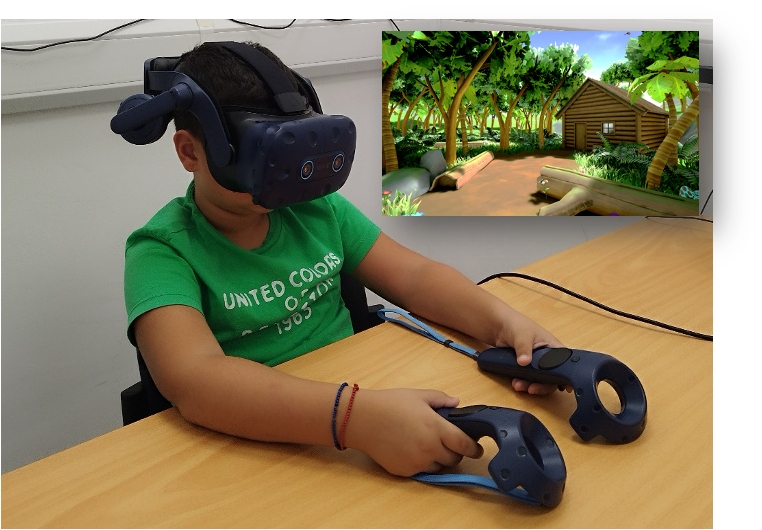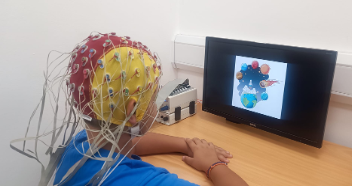 |
MEMORY & ATTENTION DEVELOPMENT LAB (MADLAB) |
"Understanding and enhancing cognition in health and disease"Andria Shimi is an Assistant Professor in the Department of Psychology, University of Cyprus (UCY). She is a Developmental Cognitive Neuroscientist, a licensed School Psychologist, and the Director of the Memory and Attention Development Lab (MADLab). Andria specialises in cognitive and brain development and neurodevelopmental disorders. She holds a BSc degree in Psychology from the National and Kapodistrian University of Athens (with Excellence), a 3-year MA degree in School Psychology from the University of Cyprus (with Excellence), an MSc in Psychological Research from the University of Oxford (with Distinction), and a PhD in Developmental Cognitive Neuroscience from the University of Oxford. Her PhD studies were supported with independent scholarships by the Bodossaki and Leventis Foundations. Following her studies, she worked as a postdoctoral researcher first at the Medical Research Council, Cognition and Brain Sciences Unit at the University of Cambridge (2012-2013) and then at the University of Oxford (2013-2016). In addition, during her doctoral and postdoctoral years, she worked as a visiting scientist at the Sackler Institute for Developmental Psychobiology, Weil Medical College of Cornell University (New York), the University of Oregon, and the University of Edinburgh. In 2016, she joined the Cyprus Institute of Neurology and Genetics for 2 years as a Marie Curie Fellow, after successfully securing a competitive Marie Skłodowska-Curie Individual Fellowship funded by the European Commission. Since 2018 she has been a faculty member at the Department of Psychology (UCY). Her interdisciplinary research using behavioural and neuroscience methods has been funded by various national and international funding bodies.
Assistant Professor Andria Shimi Director of Memory & Attention Development Lab Department of Psychology University of Cyprus shimi.andria-AT-ucy.ac.cy; (+357) 22 892046 |
My research focuses on understanding the neurocognitive development of attentional control, working memory, and executive functions in both healthy and clinical populations. I am particularly interested in how attention develops across the lifespan, how attentional mechanisms function in the brain, and how attentional deficits impact other cognitive processes such as working memory and other executive functions in clinical conditions. To investigate these questions, I employ a range of methods, including behavioural and neuropsychological assessments, electroencephalography (EEG), Virtual Reality (VR), and eye tracking. My research is centred around two main areas: 1) identifying neurocognitive markers of efficient and inefficient performance, and 2) translating these markers into interventions to improve cognitive and brain health.
Neurocognitive markers of attention and working memory in Typical Development, Neurodevelopmental Disorders, Sports and Mental HealthAttention and memory are foundational cognitive processes that are critical for daily functioning. Both processes become more refined during development and my research aims to unravel the cognitive and neural mechanisms that underlie their development and refinement. I focus on how attention and memory interact dynamically during typical development, as well as how deficits in these processes manifest in neurodevelopmental disorders like ADHD, or in mental health conditions such as depression. Additionally, I explore the role of attention and memory in sports performance, identifying the key processes needed for optimal execution. My research has pioneered the systematic exploration of how attentional control influences the encoding and maintenance of visual working memory (VWM) across development. Through this work, I have developed a model that highlights the critical role of attentional control in shaping VWM capacity. |
This model demonstrates that developmental and individual differences in attentional mechanisms account for variations in how information is prioritized for successful memory retention. One key aspect of my research is identifying how attentional demands at different stages of information processing, such as encoding, maintenance, and retrieval, affect VWM performance. By using advanced techniques like probabilistic mixture modeling, I have shown that attention can enhance memory precision by increasing the likelihood of correct item storage, maintenance, and recall, while reducing errors like misbinding and random guessing. At the neural level, I have identified EEG markers that signal efficient attentional orientation toward external stimuli and internal representations. By tracking these neural signals, we can track how individuals dynamically allocate attention to relevant information during different stages of memory processing and how these patterns differ across developmental stages and individuals. My findings suggest that age-related differences in VWM capacity are driven by the maturation of attentional control networks, which facilitate the formation of more precise and efficient memory representations. I also extend my research to applied contexts, such as VR environments, where I study the impact of distractions, like heavy classroom decoration, on children’s memory performance. Additionally, in collaboration with biomedical engineers, we integrate brain-computer interfaces (BCIs) with VR in cognitive gaming platforms, creating immersive environments that monitor and enhance cognitive performance in real time. This research has applications not only in education but also in sports science, where we examine how neural markers of attention contribute to athletic performance, particularly in tasks such as soccer goalkeeping. These interdisciplinary efforts not only advance our understanding of cognition but also highlight the potential of combining neural methods with applied technologies to design interventions that optimize cognitive performance across a variety of domains.
|
TranslationalResearch – InterventionsBuilding on the identification of neurocognitive markers, my research extends into developing and testing interventions designed to ameliorate cognitive deficits. These interventions aim to enhance cognitive and brain health, particularly for those experiencing attentional or memory challenges. A key aspect of my work involves the integration of advanced technologies such as EEG and VR to create personalized, immersive training environments. One innovative line of research involves the creation of VR mindfulness interventions aimed at enhancing attentional control. The immersive nature of VR helps to engage users more deeply in mindfulness practices and promotes a heightened state of attentional awareness. By using real-time EEG monitoring in future research, these VR environments can dynamically adjust to users’ cognitive states, offering personalized feedback that enhances attentional control. This closed-loop approach ensures that interventions are tailored to individual needs, maximizing engagement and efficacy. These VR-based interventions are designed to enhance focus, reduce stress, and improve working memory, particularly in clinical populations such as children with ADHD or individuals experiencing cognitive difficulties. Ultimately, my goal is to translate insights from cognitive neuroscience into practical interventions that can benefit diverse populations, supporting both mental health and optimal cognitive function. This research not only offers exciting new ways to enhance attention and memory but also opens doors to scalable, engaging, and effective cognitive training solutions for both clinical and educational contexts. |
 |
|
SELECTED PUBLICATIONS
|

